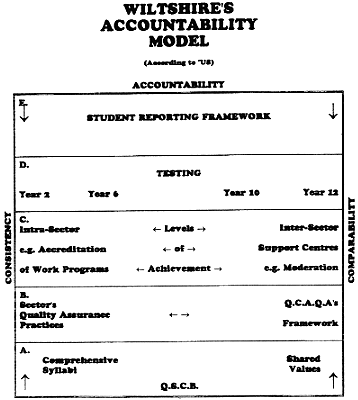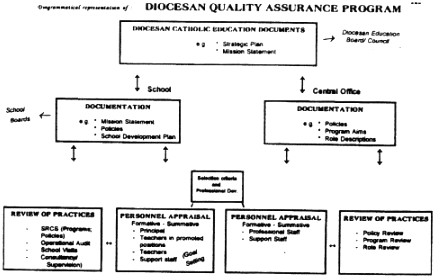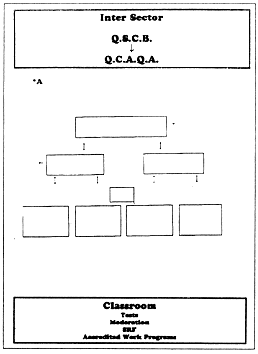[ Contents Vol 10, 1994 ] [ QJER Home ]
Wiltshire - Another perspective
Implications for the Catholic sector of quality assurance initiatives[1]
Dianne Reardon
1. WHAT WILTSHIRE IS ASKING.
A summary of what Wiltshire is asking is illustrated in the figure opposite [below]:
- Foundation - Comprehensive Syllabi and shared Values - Locus of responsibility QSCB.
- Unpacking these to Quality Assurance Practices - we have each sector's practice built within a framework supplied by QCAQA - since all sectors will be represented in QCAQA the informing should flow both ways.
- Moving up a level of specificity the report nominates a number of intra and inter-sector Q.A. practices - this is fairly familiar territory for Queensland educators with teacher professional judgement strongly in play.
- Now we move to not so familiar territory - across layer C where teacher professional judgement could predominate - we now have a testing layer - some people might use the terms subjective and objective to describe these layers.
- Then we have the SRF which expresses the Syllabi as learning outcomes and will be used to report student achievement against those outcomes.
It would be hoped that the flow of informing would be multi directional, e.g. shared values <-->QCAQA framework<-->Sector's QA practices<-->Moderation practices.
2. THE PRESENT CONTEXT IN THE CATHOLIC SECTOR IN RELATION TO QUALITY ASSURANCE.
There are two types of accountability - Financial and Educational. Basically we see ourselves as being accountable to 3 bodies:
Our parents and students:
It could be said that it is at this level that there is the most direct accountability link. As parents and students will vote with their feet. If we don't deliver the quality they want they "Don't Come, Don't Stay"
Church
If our primary purpose is spreading the Message of Christ then our practice must be
authentic to that purpose.
Society
Through elected Government to society for a genuine contribution to the "common good"
The whole sits in a framework of consistency, accountability and comparability as shown below.

3. POSSIBLE FUTURE WITH WILTSHIRE
The interface with Wiltshire's recommendations and our quality assurance practices will be more at the diocesan level

Implications for "us" if Wiltshire's quality assurance recommendations are implemented:
- The first implication is that it will add a box above and a box below the diagram just presented (see figure opposite [above]).
Our sector will be intrinsically linked with other sectors. We already have strong, in practice links, but with Wiltshire we will be in decision-making forums by right rather than by invitation, and as participants in decision making we will have responsibility to implement those decisions.
Quality Assurance is a diocesan responsibility. So Wiltshire's recommendations would involve us in a real "leap-frog" situation. We do not have any central locus for QA in our sector. If we are expected to speak with one voice at an inter-sector level, we will need another box at *A to coordinate that voice. Structurally, therefore, there are implications for us and, since our diocesan structures are built on a philosophy, and, indeed, a theology, this will be an interesting and much debated issue.

We would say that all our QA practices are aimed at quality in the classroom but we focus on inputs - we provide registered teachers, we provide consultancy services, resources, specialists etc. etc. In our school renewal we look at whether programs are comprehensive and sound, policies align with values, administration practices are effective etc. - but rarely, in my experience, do we use student achievement as data in making judgements about quality. Wiltshire asks for at least an extension of focus - for us.
The implementation of school renewal across the sector is very diverse in terms of process, product and robustness. Participation with QCAQA would no doubt see a conformity not there at present.
- To be more specific - we consider that these are some of the things in relation to QA being asked of us by Wiltshire and what that means.
| A set of Shared Values as Foundation | - | This is a concept we are familiar with - all our schools would have a values statement and would be used to embedding the articulated values in the curriculum. |
| - | Whether it is possible to get a set of shared values across the total education community is another question and I know this has been spoken of in other forums. (e.g. competition vs cooperation). |
| Accreditation of work programs | - | Presently handled 'in school' (except 11 & 12) - to have sector-wide accreditation would be something new for us - my feelings is that we would see it as unnecessary though we recognise that it is about comparability. (To have accreditation within an inter-sector framework would be very new.) |
| Testing programs | - | We already cooperate with the light sampling testing and if we were convinced that controls were sufficient to guard against a culture of competition replacing the aspired to culture of cooperation we would at least dialogue on the Yr 2, 6 and 10 testing. There is stronger feeling about the year 12 reference test - it is seen as unnecessary. |
| Moderation of Student Assessment | - | Not formally present at P-10. Unlikely we would support "expert moderators" visiting the school. I believe it should be based on a model of classroom teacher working with classroom teacher. This model of moderation has proved to be great professional development in the secondary school and should prove the same in primary. Teachers learn from teachers. |
| Student Reporting Frameworks | - | Presently reporting frameworks are school based and there is genuine consultation with parents. The usual pattern is - Parent/Teacher meetings at the beginning of the school year - verbal and written report mid-semester - a written report only at the end of the year. In secondary there is usually also interim reporting in mid-semester one. |
In the schools I have worked in, the concept of profiling has been well received. It is seen as:
- having the potential to provide consistency
- being focused on achievement
- capable of promoting self-directed learning
- providing a common language for parents/students/teachers
Certainly the concept of a reporting framework would be considered, however, teacher work load would be an issue.
4. AREAS FOR "INTENSIVE DIALOGUE"
(a) Comprehensive/Prescription
High quality comprehensive syllabi and supporting documents would be excellent resources for classroom teachers and their development would be worthwhile. However, the mandatory use of definitive curriculum documents will not ensure quality learning. Teachers ensure quality learning.
Most Queensland teachers are highly experienced and well qualified (and getting more so every day). They have the competence to assemble learning experiences from a diversity of resources including their own experimentation. They ought to have the freedom to develop student responsive courses in this way. Those that find the challenge too hard, or are new to the profession, would have the centrally developed documents to fall back on.
Why not extend the market mentality that has pervaded so much of education thinking and say that if the syllabi are good enough they will be used?
(b) Professionalism/Instrumentalism
It is my experience that for anyone who has had the opportunity to observe teachers in the USA and UK, the temptation on returning home is to grab and hug the first Queensland teacher you see - they are professional treasures, particularly in terms of curriculum development.
Prescriptive curriculum documents could stifle the extraordinary professional growth that has taken place. Teachers in Queensland have been stretched by the responsibility they have been given - lets not take one iota of that responsibility away.
(c) Control/Accountability
It is one thing to be called to give an account of what you are doing. It is another to have what you are doing controlled by accountability procedures.
If you say this quickly
- centrally develop comprehensive syllabi
- consistent teacher use of running records in literacy and numeracy
- state-side diagnostic testing Yr 12
- state-wide literacy, numeracy and basic skills testing at Yr 6
- light sampling testing at Yr 10
- reference testing, core skills testing, and Student Eduction profile at Yr 12
- moderation of teacher judgements
- accreditation of work programs
- certification of existing certificates
- reporting against pre-determined learning outcomes
a flavour of control begins to seep in.
The Report talks about "a new regime of accountability, particularly in relation to students and parents." With our community based Education Councils (our School Boards) negotiated parent-teacher reporting programs and a participative, validated School Renewal process we believe we are doing fairly well in the accountability arena - there are few complaints. I have heard few about any sector in fact.
(d) Independence/Interdependence
The strength of 'shared wisdom' is a fact, not just a catch cry. There would be great gains by working with colleagues in inter-sector structures. But it is only natural that we ask questions about the cost. How much independence do we have to lose to gain the benefits of interdependence?
(e) Pragmatics
For just about every recommendation and certainly for those associated with QCAQA you could ask the question "And HOW exactly will that work?" The pragmatics of many initiatives still have to be clarified. The Report challenges us :o think about what we want. Perhaps How to make it work comes next.
(f) Cost
At present we are debating if we want the Wiltshire initiatives. But even if we want them, and can work out how to make them work, is there the money to get them and sustain them?
5. FINAL COMMENTS
To end on a positive note - some Key Initiatives we commend:
- Inter-sector co-operation
- Emphasis on accountability to students and parents
- Emphasis on literacy and numeracy (especially in the early years)
- A Reporting Framework based on outcomes and giving parents, students and teachers a common frame of reference to give meaning to student achievement
- Directing the focus on curriculum - the very life of schools
ENDNOTE
- This paper was one of a series presented to officers of the Department of Education on the Wiltshire Review of the Queensland School Curriculum and provides another sector's perspective on the Review quality assurance issues.
| Please cite as: Reardon, D. (1994). Implications for the Catholic sector of quality assurance initiatives. Queensland Researcher, 10(2), 33-39. http://education.curtin.edu.au/iier/qjer/qr10/reardon.html
|
[ Contents Vol 10, 1994 ] [ QJER Home ]
Created 4 Sep 2005. Last revision: 4 Sep 2005.
URL: http://education.curtin.edu.au/iier/qjer/qr10/reardon.html




